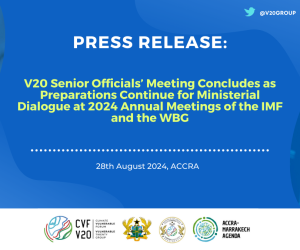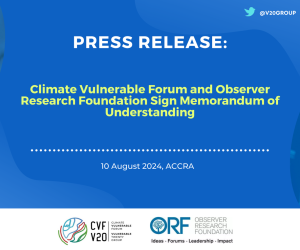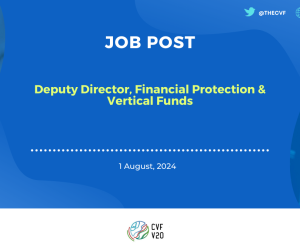V20 Statement on Opportunities for the Resilience and Sustainability Trust to Deliver Accelerated Support for Climate-Vulnerable Nations
STATEMENT BY THE V20
27 October 2021
Climate-fuelled impacts are accelerating
The latest IPCC Assessment Report on August 2021 has officially confirmed that due to inadequate global emission reduction measures, the 1.5-degree limit of the Paris Agreement may be breached this decade. Severe climate impacts, originally thought to be more long term, will thus materialize sooner than expected. In short, climate change is now in a constant state of acceleration. This spells economic and financial destruction and devastation for the world’s most climate vulnerable developing countries, especially the Vulnerable Twenty Group (V20). Certainly, climate and multilateral finance continues to fall short of expectations.¹
Recalling V20 Climate Prosperity Recovery Agenda in the 1st V20 Climate Vulnerables’ Finance Summit Communique in July 2021
Failures of major economies to reduce their climate pollution, such shortcomings in international financing directly inhibit the level of action we can take, compounding the exposure of our most vulnerable, least responsible economies to far more costly annual levels of loss and damage than any amount of finance received or promised from significantly carbon emitting nations. As least developed, small island, emerging, and landlocked developing economies, such failures undermine our efforts to transition to a resilient, carbon-neutral future, particularly amid of the economic shocks of the global COVID-19 pandemic.
The current programs in the IMF focus on dealing with financial shocks while the physical shocks caused by climate change have inadequate support. There is a need for a fit-for-purpose initiative of Bretton Woods system to tackle the global market failure of the climate crisis while adding vitality to a just and sustainable recovery including to deliver on the promise of a new, resilient economy, such as through the proposed V20 Climate Prosperity Recovery Agenda² that we call on the IMF to support, especially with the upcoming special drawing rights allocation for the poorest and most climate vulnerable countries to be given greater allocations. Moreover, the agenda calls on for special support for climate vulnerable developing countries in order to build a resilient economic system and to fill resource gaps to deal with non-financial shocks.
Recalling the G20 Finance Ministers Communique in July 2021
G20 Finance Ministers in their Communique a few days later called on the IMF to “to quickly present actionable options for countries to voluntarily channel a share of their allocated SDRs to help vulnerable countries finance more resilient, inclusive and sustainable economic recoveries and health-related expenditures through the creation of a new trust fund”³.
Recommendations for the Resilience and Sustainability Trust ⁴, ⁵
We therefore recommend for the Resilience and Sustainability Trust to support climate vulnerable countries in reducing and managing macro-financial risks stemming from the physical and transition impacts of climate change, leveraging opportunities from climate policies to boost growth, investment, and resilience.
- With a possible volume of $100 billion and over, the RST is a starting point and should be considered the floor.
- The RST should be eligible to low-income and middle-income countries facing high climate physical or transition risks. The RST should not be confined for use for countries with existing IMF programs and should not have a limit of 100 percent of quota or $1 billion per country.
- The RST can support debt restructuring efforts to countries that request for it by providing collateral to guarantee restructured debt. This may be helpful for countries that are not ‘low-income’ in terms of GDP but may be interested in debt restructuring options. This can also provide capacity for countries to respond to climate shocks without significant increases in debt burdens. For example, this could be achieved by providing the necessary support between debtors and creditors to redirect debt servicing payments towards new investments in rendering the underlying projects more resilient to climate change and compatible with the green transition. The freed-up resources from debt servicing could, for example, be invested in adaptation, nature-based solutions to render infrastructure projects more resilient to climate harm, while outdated thermal coal, diesel or other fossil power plants could, for instance, be recapitalized and transformed into hubs for green hydrogen production, waste to energy or biomass power generation facilities.
- The RST can enhance public sector funding and debt management strategies by supporting the diversification of government revenue away from high-risk sectors.
- Climate and disaster risk financing and insurance instruments are too expensive for many of these countries, and climate change could eventually make them uninsurable. The RST can complement efforts of the G20+ and V20 InsuResilience Global Partnership by creating a climate and disaster risk financing and insurance support to reduce the impact of climate shocks and to close the 98% financial protection gap in climate vulnerable countries.
- The RST can complement policy frameworks that facilitate adaptation, resilience-building and less disruptive green transitions. No other global body has the mandate and the wherewithal to implement a comprehensive approach to climate risks.
- Vulnerable economies on the climate frontlines face high capital costs that are higher in part due to significant climate risks. Climate change worsens what are already increasingly difficult cost of capital challenges and it accentuates the fact that the maturity of private capital to vulnerable countries is also in short supply. The RST can catalyze low-cost financing and capacity building for poorer, climate vulnerable countries to build climate resilience and adaptation strategies.
- The RST can support climate proofing expenditure by ensuring that climate related expenditure in the budget is consistent with National Climate Strategies, Nationally Determined Contributions (NDCs) under the UNFCCC and Climate Prosperity Plans under the CVF and V20.
- The RST should be periodically reviewed in scope and potentially expanded over time to anticipate needs of climate vulnerable developing countries.
The RST can and should enable and accelerate the implementation of economic development strategies that help establish resilience at the heart of macroeconomic fundamentals while encouraging unprecedented global collaboration. The continued robust leadership at the IMF will be indispensable to sustaining momentum for the world economy under threat now as never before, and especially so for the most vulnerable among us. The window to build resilient green economies is rapidly closing. Global efforts must safeguard the 1.5-degree Centigrade limit of the Paris Agreement while accelerating adaptation and resilience capital to be deployed swiftly and at scale.
FOOTNOTES
¹ IPCC (2021), AR6 Climate Change 2021: The Physical Science Basis, https://www.ipcc.ch/report/ar6/wg1/
² V20 (2021), V20 Climate Prosperity Recovery Agenda, https://www.v-20.org/resources/publications/v20-climate-prosperity-recovery-agenda: Together with the involvement of partners, the V20 Climate Prosperity Recovery Agenda aims to ensure systematic consideration of climate risk and, in parallel, explore special financial support options (including but not limited to additional Special Drawing Rights allocations to overcome significant liquidity shortfalls) for climate frontline economies, including capacity development and crisis assistance, among other items.
³ G20 (2021), Third G20 Finance Ministers and Central Bank Governors meeting under the Italian Presidency, July 10th, https://www.g20.org/third-g20-finance-ministers-and-central-bank-governors-meeting-under-the-italian-presidency.html
⁴ Steele, Paul, Patel, Sejal and Volz, Ulrich (2021) ‘Creating a Resilience and Sustainability Trust (RST) at the IMF: How to Support Climate-vulnerable Countries.’ Policy Note, London: International Institute for Environment and Development and SOAS Centre for Sustainable Finance.
⁵ Task Force on Climate, Development and the International Monetary Fund (2021), Re-channelling Special Drawing Rights for a Climate Resilient and Just Transition: Prospects for the Resilience and Sustainability Trust.





